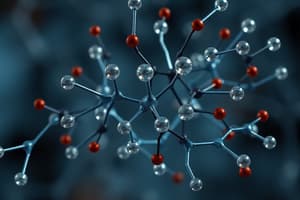Podcast
Questions and Answers
What characterizes a syndrome according to the definition provided?
What characterizes a syndrome according to the definition provided?
- It is a combination of signs and symptoms that co-occur suggesting a common cause. (correct)
- It is defined by a single symptom or sign.
- It can be recognized through distinct and separate treatment for each sign.
- It only describes symptoms without any relation to underlying conditions.
In the context of mental disorders, significant distress or disability must be present. Which of the following is NOT considered a type of disability?
In the context of mental disorders, significant distress or disability must be present. Which of the following is NOT considered a type of disability?
- Social disability
- Cultural disability (correct)
- Occupational disability
- Disability in important activities
What distinguishes a mental disorder from an expected cultural response to loss, such as bereavement?
What distinguishes a mental disorder from an expected cultural response to loss, such as bereavement?
- The presence of physical illness.
- The involvement of therapeutic intervention.
- An unrecognized symptom that is not culturally acknowledged.
- The typical course of the emotional response over time. (correct)
Which of the following statements reflects the overall definition of mental disorders?
Which of the following statements reflects the overall definition of mental disorders?
What does the term 'pathogenesis' refer to in the context of syndromes?
What does the term 'pathogenesis' refer to in the context of syndromes?
What is a necessary criterion for considering a behavior as a disorder?
What is a necessary criterion for considering a behavior as a disorder?
Which term describes a situation where an individual experiences a problem due to a behavior that is not functioning as intended?
Which term describes a situation where an individual experiences a problem due to a behavior that is not functioning as intended?
In which scenario would experiencing a physiological reaction be considered a normal response?
In which scenario would experiencing a physiological reaction be considered a normal response?
What is implied about individuals who do not feel distress when it is expected?
What is implied about individuals who do not feel distress when it is expected?
What does the term 'maladaptive' indicate in the context of psychological behavior?
What does the term 'maladaptive' indicate in the context of psychological behavior?
Flashcards are hidden until you start studying
Study Notes
Defining Mental Disorders
- Distress and disability are key features in defining mental disorders.
- Distress is not sufficient to diagnose a mental disorder.
- Disability refers to impairment in social, occupational, or other important activities.
- Culturally common responses to stressors (e.g., grief) are not considered mental disorders.
Syndromes
- A syndrome is a collection of signs and symptoms that frequently occur together.
- Syndromes might suggest a common underlying cause, a familial pattern, or treatment options.
- Most disorders are characterized by multiple signs and symptoms.
Neurotransmitters and Mental Disorders
- Research suggests a link between neurotransmitters and mental disorders.
- Serotonin and dopamine are implicated in depression, mania, and schizophrenia.
- Norepinephrine is associated with anxiety and stress-related disorders.
- GABA is often linked to anxiety disorders.
- Medications for mental disorders commonly target specific neurotransmitters.
Theories of Neurotransmitter Involvement
- Theories regarding how neurotransmitters contribute to mental disorders are evolving.
- Some theories propose excessive or insufficient levels of neurotransmitters as a cause.
- Other theories involve insufficient reuptake or sensitivity of postsynaptic receptors.
Psychodynamic Perspectives
- These perspectives emphasize the role of internal processes and early life experiences.
- Object relations theory focuses on early relationships, especially with the mother.
- Interpersonal perspective emphasizes the impact of relationships on mental health.
- Interpersonal therapy, a psychodynamic approach, has moderate empirical support.
Behavioral Perspective
- Behaviorism emphasizes directly observable behaviors and their environmental causes.
- It assumes behavior, whether normal or abnormal, is learned through experience.
- John B. Watson's work in 1913 argued for a scientific approach to behavior.
- Classical, operant, and social learning are central to understanding behavior.
Measuring Behavior
- The behavioral perspective emphasizes studying observable behaviors.
- The work of John B. Watson and Ivan Pavlov significantly influenced the behavioral perspective.
Studying That Suits You
Use AI to generate personalized quizzes and flashcards to suit your learning preferences.




